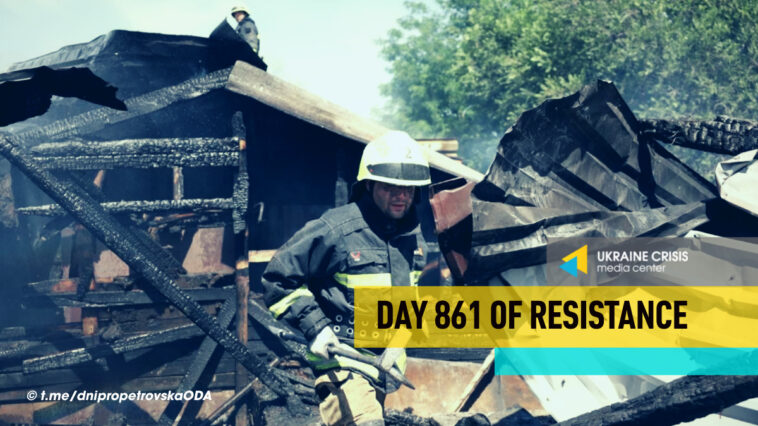A Russian missile and drone strike on Dnipro kills five and injures 53 others. A Ukrainian drone strike disrupts operations at a vital Russian plant linked to military industries. NATO members pledge 40 billion euros in military aid for Ukraine, diplomats say.
Russian missile, drone strike on Dnipro kills five, injures 53 others
A Russian missile and drone strike on Dnipro on Wednesday morning killed five people and wounded 53 others. Officials said shops, schools and hospitals were damaged by the strike.
Ukraine’s Air Force said Russia had launched three Iskander-K cruise missiles, four Kh-59 guided missiles and five Shahed drones on Dnipropetrovska region. Ukraine’s air defenses shot down an Iskander-K missile, all four Kh-59 missiles, all five Shahed drones and an Orlan-10 reconnaissance drone.
Blasts blew out some windows and damaged the façade of the Apollo shopping mall that was targeted by a Russian missile strike late last year.
Ukrainian President Volodymyr Zelenskyi renewed his appeal to Western allies to supply Ukraine with further air defense systems. “Dnipro: Russian terrorists have struck our city again. As of now, five people have been killed, and thirty-four injured, including a child. All necessary services are on site, and rescuers are helping all the victims,” he wrote on social media.
“Only two things can stop this Russian terror — modern air defense systems and the long-range capabilities of our weapons. The world can protect lives, and it requires the determination of leaders. Determination that can and must make protection from terror the norm again,” Zelenskyi said.
Borys Filatov, the mayor of Dnipro, announced a day of mourning for Thursday. Flags at the city council will be lowered to half-staff. The mayor called on other state and municipal agencies, and private companies in the city to tie a black ribbon above the full-staffed flags.
Ukrainian drone strike disrupts operations at vital Russian plant linked to military industries
A Ukrainian drone strike on electric substations in Russia’s Belgorod region disrupted operations at the Ugarov Oskol electro metallurgical plant in the Voronezh region.
The attack was a joint operation conducted by the Main Intelligence Directorate of Ukraine’s Defense Ministry and the Foreign Intelligence Service. The Oskol plant is said to be the only full-cycle metallurgical facility in Russia.
The plant stopped operating after suicide drones hit two major electric substations in the Belgorod region: one called Stary Oskol near the village of Neznamovo and another called Metallurgicheskaya near the village of Volokonovskoye, Ukrainska Pravda said, citing unnamed sources in Ukraine’s defense intelligence.
Following the attack, the plant completely lost power, leading to the shutdown of all electric arc furnaces and freezing of metal inside the chambers. Up to several months could be needed to restart the furnaces. According to the sources, the plant is a vital facility for the country’s military industries as it produces high-quality steel, including alloyed steels for the auto industry and machinery.
Russian military industry companies, including GAZ, UAZ, KamAZ, and bearing manufacturers EPK and SKF are using the plant’s products.
NATO members pledge 40 billion euros in military aid for Ukraine, diplomats say
NATO allies have agreed to fund military aid for Ukraine with 40 billion euros ($43.05 billion) next year, a Western European diplomat told Reuters on Wednesday, a week before the alliance’s leaders are set to meet in Washington.
NATO Secretary-General Jens Stoltenberg had asked allies to make a multi-year commitment to keep military aid for Kyiv at the same level as that since Russia’s full-scale invasion of Ukraine in 2022, adding up to about 40 billion euros a year.
While the member states did not back Stoltenberg’s original request for such a multi-year pledge, the pact includes a provision to re-evaluate allied contributions at future NATO summits, according to a diplomat.
Allies also decided to have two reports over the next year to establish which country supplies what to Ukraine, the diplomat said, to meet demands for more transparency over the burden sharing in the alliance.
The financial pledge is part of a broader Ukraine package that NATO leaders will agree when they gather for the Washington summit from July 9 to 11.
In June, allies decided that NATO would assume a greater role in co-ordinating arms supplies to Ukraine, taking over from the United States in a bid to safeguard the process as NATO-sceptic Donald Trump seeks a second term as U.S. president.
According to media reports, at the Washington summit, the alliance will announce that it has agreed to set up a mission in Germany to coordinate aid of all kinds to Ukraine over the longer term. Called the NATO Security Assistance and Training for Ukraine, or NSATU, the mission will work to reduce duplications and complications from the various kinds of weaponry sent to Ukraine.
The NATO alliance is also weighing plans to install a permanent new Ukraine envoy based in Kyiv. The new envoy would coordinate the alliance’s support for Ukraine, including the flows of military assistance to Kyiv from various Western countries, according to Foreign Policy.




